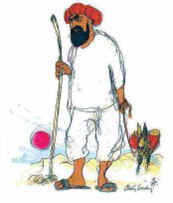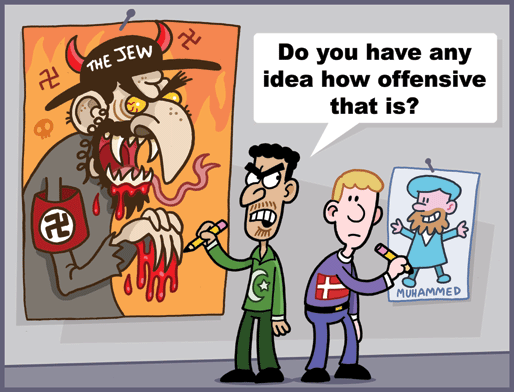 |
| One of
the controversial cartoons. |
|

Special Dossier: Danish Cartoons
Publisher's Note
Many newspapers in the U.S. decided not
to depict or provide links to the Danish cartoons of the prophet
Mohammed which is the subject of the current controversy. We at the Philadelphia
Jewish Voice have chosen to allow our viewers to see some of the
images for themselves.
Knowing that Muslims are outraged, many
people assume the images are outrageous without seeing them. The
image to the right and 11
others were printed by the Danish newspaper Jyllands-Postens
in September 2005 in response to a Danish author lamenting that he
could not find an illustrator for his biography of Mohammed.
The paper introduced this collection of
cartoons saying: "The modern, secular society is rejected by some Muslims. They demand a special position, insisting on special consideration of their own religious feelings. It is incompatible with contemporary democracy and freedom of speech, where you must be ready to put up with insults, mockery and ridicule. It is certainly not always attractive and nice to look at, and it does not mean that religious feelings should be made fun of at any price, but that is of minor importance in the present context. [...] we are on our way to a slippery slope where no-one can tell how the self-censorship will end. That is why
Morgenavisen
Jyllands-Posten has invited members of the Danish editorial cartoonists union to draw Muhammad as they see him."
Some Imams have circulated three
additional cartoons claiming that they were published by the Danish
newspaper. These additional cartoons are far more objectionable but
they do not appear to have been published by the Danish newspaper.
One was a wire-service photo of a contestant at a French
pig-squealing contest. Another portrayed a Muslim being mounted by a
dog, and the third portrayed Muhammed as a demonic pedophile.
A Jordanian editor asked "which
hurts the reputation of Islam more, these cartoons, or TV images of
Muslims slashing the throats of hostages?" He was fired and is
now in jail.
I believe our readers are mature enough
to make up their own minds.
The Cartoons That Shook The World
Bruce Ticker
It was 17 years ago on Valentine's Day when Iran's late Ayatollah Ruhollah Khomeini issued a death warrant against author Salman Rushdie for supposedly blaspheming Islam. A few days later, I was browsing through a bookstore, then on Philadelphia's Chestnut Street, when two young men charged through the store warning shoppers against purchasing his book, "The Satanic Verses."
I felt both intimidated and furious at the same time. I thought of challenging them. Looking back, I wish I had asked the manager to call the police. The same twin feelings emerged after Muslims around the world, especially in Middle East countries, responded with violence to a series of cartoons depicting Islamic founder Muhammad in various militant poses.
It is hard to come to grips with whether a number of European newspaper editors were wise to reprint those cartoons. It clearly fed an orgy of reckless protests that included the destruction of a building housing the Danish mission in Beirut.
One part of me says that the editors should have published the cartoons to stand in solidarity with their peers at two publications which carried the cartoons months earlier. Nobody can tell me what books to buy and nobody can tell newspaper editors what to print.
There is a crucial question which has barely been raised: Was publication of these cartoons a responsible action when there was a likely possibility that violence could ensue?
These cartoons have no discernible news value, and anyone with passing familiarity of the Muslim world recognizes the potential results. Extremist Muslims are often casual about death and destruction, even when their own are victimized, but they take it very seriously if their religious beliefs are insulted or their traditions are disrupted.
This in no way justifies the reaction to publication of the cartoons, which has claimed its first innocent victim. The New York Times briefly reported that a Catholic priest was shot to death in Turkey's Black Sea port of Trebizond by a young man who shouted, "God is great!"
Most mainstream American and British newspapers have declined to reprint the cartoons. One exception is The Philadelphia Inquirer, located seven blocks from my apartment building. (ed.note: For that decision they were roundly picketed.) Perhaps all these editors figured that publishing offensive material with zero news value might inflame already high tensions and contribute to deaths, injuries and property destruction.
Newspapers such as The New York Times and The Washington Post regularly hold, kill and revise news stories if the White House can convince editors that information in these stories might endanger national security. Reporters covering the wars in Iraq and Afghanistan abide by censorship rules. Nor does anyone scream "fire!" in a crowded theater.
French President Jacques Chirac understands this principle. "Freedom of expression must be exercised in a spirit of responsibility," he told the Times. "I condemn all manifest provocation that might dangerously fan passions."
Freedom of the press is accepted by westerners, no matter how reluctantly, but in the Muslim world any manifestation of press freedom that they do not like is an act of war. Under these circumstances, why push our luck?
Untangling the Muhammad Cartoon Controversy
Rabbi Avi Winokur
The controversy over the political cartoons lampooning Muhammad raises a whole
host of issues that are important to untangle and engage on their respective
merits.
The cardinal principles of freedom of speech and freedom of the press must be
respected and upheld. From an American constitutional perspective governments
correctly did not prohibit the publications of these cartoons. However to the
extent that these cartoons were published in nations that have hate crime/group
libel legislation that permits prior restraints then these cartoons should have
been treated in the same manner as other similarly offensive material.
Europe in particular needs to take a hard look at its anti-clerical bias, and
the all too prevalent condescension toward religion in light of recent events
and ask itself if its vaunted tolerance and cosmopolitanism has blind spot when
it comes to religion.
In any case, the right to publish is not co-extensive with the advisability of
publishing. Publishers ought to subject any material that demeans or unfairly
characterizes an entire religious group to rigorous scrutiny. While authors
may have the right to lampoon any group they wish, publishers are not required
to publish offensive material. Likewise, militant, nonviolent, pressure on
publishers in no way infringes on any basic rights of publishers or authors.
Those who cherish freedom of expression must cherish as well the freedom to
loudly and angrily protest that expression.
There is no excuse however for protest to become violent. Provocation is no
excuse. Violent protest against protected expression, however provocative must
be condemned without excusing it on grounds of provocation.
This case raises the additional issue of clean hands. That is, those who
protest offensive lampooning, stereotyping and caricaturizing of their own
religion ought not to promote such activity with respect to other religions.
Muslim publications, particularly, but not only in the Middle East have
depicted Judaism, Jews, Christianity and Christians in outrageously offensive
terms. Muslim protests in this case would get a far more sympathetic hearing
were their own hands clean of the same actions. In that regard, President
Mahmoud Ahmadinejad's recent remarks denying the Holocaust only weakens the
Muslim case in the West.
Given the drift of Muslims in many quarters towards a more fundamentalist
approach to Islam, it is particularly heartening to see the courageous
emergence of more moderate Muslims in the public square, who are willing to
fight against the high jacking of their religion by extremists. If this
controversy strengthens their will and commitment to the struggle to take back
their religion, it would be a wonderful consequence of an otherwise sordid
affair, in which almost all sides have behaved badly.
Rabbi Avi Winokur is a member of the Board of JSPAN and the spiritual leader of
Society Hill Synagogue in Philadelphia.
Previous Special Dossiers
|



